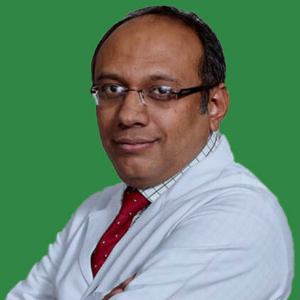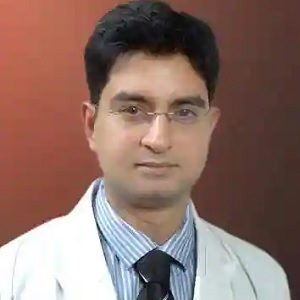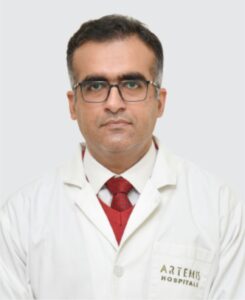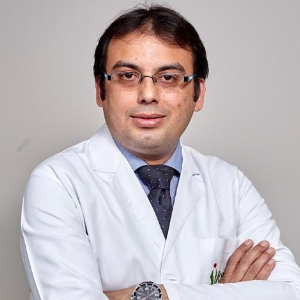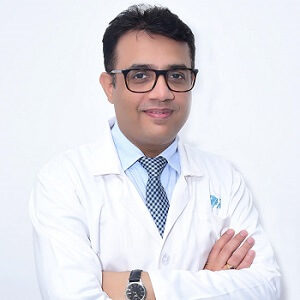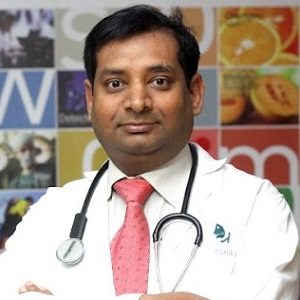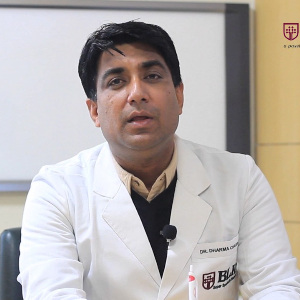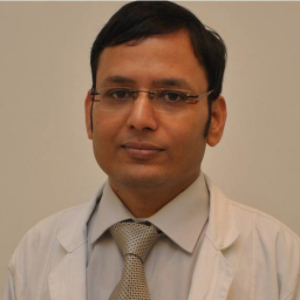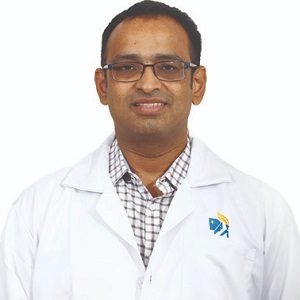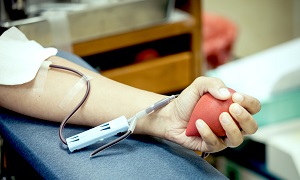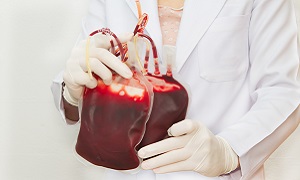Best Allogeneic BMT Doctors in India
- Hematologist & BMT Specialist, Gurugram, India
- Over 20 years’ experience
- Fortis Memorial Research Institute
Profile Highlights:
- Dr. Rahul Bhargava is a leading Hematologist and BMT specialist currently working at Fortis Memorial Research Institute, Gurugram.
- Dr. Bhargava has an experience of more than 20 years in Hematology, Pediatric Hemato Oncology, and BMT during which he has performed numerous BMTs with successful outcomes.
- He primarily specializes in Haploidentical and unrelated match transplants and has performed over 1500 transplants till date.
- In 2016, he became the first Indian doctor to perform and popularize BMT for Multiple Sclerosis.
- Hemato Oncologist, Gurugram, India
- Over 20 years’ experience
- Medanta-The Medicity, Gurgaon
Profile Highlights:
- Dr. Nitin Sood is a highly experienced Hematologist specializing in a wide range of blood disorders, including leukemia, lymphomas, multiple myeloma, amyloidosis, and various anemias such as thalassemia and sickle cell anemia.
- He also deals with complex conditions like bleeding and clotting disorders, as well as bone marr*w transplants.
- Currently, Dr. Nitin Sood holds the position of Director in the Department of Hemato Oncology and BMT at Medanta-The Medicity, Gurugram.
- BMT Specialist and Hemato-Oncologist, Gurugram, India
- Over 10 Years Experience
- Artemis Hospital, Gurgaon
Profile Highlights:
- Dr. Gaurav Dixit is a well-known BMT Specialist and Hemato-Oncologist in India, currently serving as the Unit Head of Hemato-Oncology at Artemis Hospital, Gurugram. His specialization primarily lies in leukemia, myeloma, lymphoma, and aplastic anemia.
- To date, Dr. Dixit has independently performed or been involved in over 500 BMTs. He is also credited for carrying out the first BMT in Kenya.
- Dr. Gaurav Dixit completed his MBBS and MD in general medicine from PGIMS Rohtak in 2008.
- Pediatric Hemato Oncologist & BMT Specialist, Gurugram, India
- Over 20 years’ experience
- Fortis Hospital Shalimar Bagh, Fortis Memorial Research Institute
Profile Highlights:
- Dr. Vikas Dua is one of the best Pediatric Hemato Oncologist and BMT specialist in India with over 200 pediatric BMTs to his credit.
- His primary area of expertise is Pediatric Haploidentical transplants, but he is also skilled in doing BMTs for pediatric patients with leukemia and thalassemia.
- He received his training in Pediatric BMT from St. Jude Children’s Research Hospital in Memphis and holds Fellowship in Pediatric BMT from the National University Hospital in Singapore.
- Top Pediatric Hemato-oncologist & BMT Specialist | Apollo Hospital, New Delhi, India
- 15+ Years Experience
- Indraprastha Apollo Hospital, New Delhi
Profile Highlights:
- Dr. Gaurav Kharya is one of India’s top pediatric hematologists. He has over 17 years of expertise and is affiliated with Indraprastha Apollo Hospital.
- Dr. Kharya specializes in Pediatric Hemato-Oncology, Immunology, and BMT. He has extensive expertise in transplanting in children with benign or malignant blood abnormalities, immunological disorders, and other conditions both nationally and internationally.
- Dr. Kharya performed around 600 BMTs with his team. He undertook the first Haploidentical BMT for sickle cell disease in India. He also depleted TCR alpha beta CD 19 in invitro by haploidentical BMT in a 4-month-old baby with severe combined immunodeficiency.
- Top Hemato Oncologist & BMT Specialist | Apollo Hospital, New Delhi, India
- 20+ Years Experience
- Indraprastha Apollo Hospital, New Delhi
Profile Highlights:
- Dr. Shishir Seth is a Hemato Oncologist and BMT specialist currently practicing at Indraprastha Apollo Hospital, New Delhi
- He is an expert Hematologist and Hemato-Oncologist with an interest in the management and treatment of different blood diseases (benign and malignant).
- He has performed over 200 Hematopoietic BMTs successfully of which 40 included Allogenic Haploidentical transplants and Antigen Mismatch transplants. He has also performed 300 Induction procedures for Acute Leukemia.
- With an experience of 20+ years in Hematology and BMT, Dr. Seth has achieved several feats in his career that have gained him immense popularity and recognition.
- Dr. Shishir Seth is involved with research work as well and has numerous publications in his name in various national and international journals.
- Top Hemato Oncologist & BMT Specialist | BLK Hospital, New Delhi, India
- 20+ Years Experience
- BLK Super Specialty Hospital, New Delhi
Profile Highlights:
- Dr. Dharma Choudhary is a renowned Hemato Oncologist and BMT specialist who is currently associated with BLK-Max Super Speciality Hospital, New Delhi. He serves as the Director and Senior Consultant at the Department of BMT and Hematology.
- With over 20 years of experience in the field, Dr. Choudhary holds the credit of performing some of the most complex BMTs in India and has had several successful results to his name.
- He has carried out more than 2000 life-saving transplants, establishing himself as one of the most trusted and experienced professionals in the field.
- Although adult leukemia and lymphoma (blood cancer) are his primary areas of expertise, he is also very skilled in treating solid tumors and a variety of benign blood diseases.
- Hematologist, Gurugram, India
- Over 17 years’ experience
- Paras Hospital Gurugram
Profile Highlights:
- Dr. Rahul Naithani is a highly skilled clinical Hematologist known for his expertise in Hemato Oncology and BMT. He is currently serving as the Director & HOD in the Department of Hematology and Hemat-oncology at Paras Hospitals in Gurugram.
- He has performed over 260 BMTs successfully, demonstrating his dedication to improving patient outcomes and advancing treatment options.
- He completed his MD in Pediatrics from Lady Hardinge Medical College in Delhi, followed by a DM in Clinical Hematology from AIIMS, New Delhi.
- Hematologist, Chennai, India
- Over 29 years’ experience
- Apollo Hospitals Greams Road
Profile Highlights:
- Dr. Prabu P is one of the top Hematologists in Tamil Nadu with an experience of more than 15+ years in the field.
- He gained most of his experience working in the United Kingdom and now practices at Apollo Hospital, Chennai.
- Dr. Prabu acquired experience in general and malignant pediatric hematology while working in the pediatric hematology unit of St James University Hospital, Leeds.
Best Allogeneic BMT Hospitals in India
- City: Gurugram, India
Hospital Highlights:
- One of India’s best and largest multi-specialty hospitals, Medanta was built with the aim to bring India to the highest standards of medical care. The hospital has been providing the best medical services to its patients, since its inception, with care, commitment, and compassion.
- Equipped with 1250 beds, the hospital was founded by Dr. Naresh Trehan in the year 2009 with an aim to provide the best medical care at affordable costs. The hospital is spread across 43 acres and includes 45 operation theatres and 350 beds dedicated solely to ICU. The hospital includes over 800 doctors, and more than 22 specialty departments and has a dedicated floor for individual specialty in order to offer the best services under one roof.
- The hospital is considered one of the premier institutes in India for Cardiac Care and includes staffs and members of high caliber. The hospital has 6 distinct centers of excellence.
- City: Gurugram, India
Hospital Highlights:
- Artemis Hospital, established in 2007 in Gurugram, India, is a leading multi-specialty institution known for its excellence in patient care and advanced medical technology, offering comprehensive services across specialties like Cardiology, Oncology, Neurology, Orthopedics etc.
- Renowned for its patient-focused care, Artemis Hospital combines state-of-the-art infrastructure with a team of internationally trained doctors and surgeons, ensuring the highest standards of medical treatment.
- Accredited by JCI and NABH, Artemis Hospital meets global healthcare quality and safety standards, reflecting its commitment to providing compassionate, personalized care.
- The hospital is recognized for utilizing cutting-edge diagnostic and ther*peutic techniques, ensuring patients receive accurate diagnoses and effective treatments tailored to their needs.
- City: Chennai, India
Hospital Highlights:
- The Apollo Proton Cancer Centre in Chennai is the most sought-after private cancer hospital in India. It is an integrated facility that provides cutting-edge, all inclusive cancer treatment to patients all over the globe.
- The hospital is a part of the renowned Apollo Group which has a large network of over 74 hospitals in India and across the globe. Out of the 74 hospitals, 21 of them are cancer centres. However, Apollo Proton Cancer Centre is the only cancer hospital to have JCI accreditation.
- The Centre, which was established on the principles of excellence and expertise, unites a formidable medical staff led by some of the most illustrious figures in cancer treatment.
- The hospital follows the global ASTRO Model Policy. It is the same global policy which is followed by countries like USA, UK, and Europe.
- Apollo Proton Cancer Centre is among the very few hospitals in India to receive patients from First World countries such as USA, Canada, New Zealand, Australia, Singapore, Thailand, etc.
- Apart from that, it is also the first hospital in Chennai to receive patients from several countries like Uzbekistan, Kazakhstan, Turkmenistan, Georgia, Armenia, Azerbaijan, SAARC countries (Bangladesh, Nepal, Sri Lanka, Maldives, Bhutan, Afghanistan, and Pakistan), South Africa, Turkey, Egypt, etc.
- In fact, there is a dedicated team at the Apollo Proton Cancer Centre that serves only international patients. Thus, on a monthly basis, the Centre receives patients from across 32 countries.
- Moreover, there are certain treatments in Apollo Proton Cancer Centre that are not available in any other centre. APCC addresses all types of possible cancers that are usually not covered by any other centre.
- City: New Delhi, India
Hospital Highlights:
- Over the last 33 years, the Fortis Escorts Heart Institute has set new standards in cardiac treatment with groundbreaking research. It is now known around the world as a centre of expertise for Cardiac Bypass Surgery, Interventional Cardiology, Non-invasive Cardiology, Paediatric Cardiology, and Paediatric Cardiac Surgery.
- The hospital has cutting-edge laboratories that perform a wide range of diagnostic tests in Nuclear Medicine, Radiology, Biochemistry, Haematology, Transfusion Medicine, and Microbiology.
- Fortis Escorts Heart Institute boasts a diverse group of bright and experienced doctors who are backed up by a team of highly qualified, experienced, and devoted support professionals as well as cutting-edge equipment such as the recently installed Dual CT Scan.
- Approximately 200 cardiac doctors and 1600 personnel currently collaborate to manage over 14,500 admissions and 7,200 emergency situations each year. The hospital now has a 310-bed infrastructure, as well as five cath labs and a slew of other world-class amenities.
- City: Gurugram, India
Hospital Highlights:
- Fortis Memorial Research Institute (FMRI) is a premier multi-super-specialty, quaternary care hospital, known for its exceptional international faculty, top-tier clinicians, super-sub-specialists, and specialized nurses, all supported by cutting-edge technology.
- It is the flaship hospital of Fortis Healthcare Limited, part of IHH Healthcare Berhad, a leading integrated healthcare services provider in India. As one of the country’s largest healthcare organizations, Fortis operates 28 healthcare facilities with over 4,500 operational beds (including O&M facilities) and more than 400 diagnostic centers (including joint ventures).
- Recognized as one of the top hospitals in India, FMRI serves as a leading referral center and aspires to be the ‘Mecca of Healthcare’ for India and beyond. Its 11-acre campus is a testament to its commitment to providing world-class healthcare.
- Accredited by JCI and NABH, FMRI is dedicated to maintaining the highest standards of healthcare quality and safety, ensuring that every patient receives the best possible care. The hospital’s reputation is further enhanced by its state-of-the-art facilities and innovative medical practices.
- City: New Delhi, India
Hospital Highlights:
- The Indian Spinal Injuries Center (ISIC), provides state-of-the-art facilities for the management of all types of spinal ailments.
- Staffed with internationally trained, acclaimed, and dedicated spine surgeons, the hospital provides cutting-edge medical & surgical technology. The hospital provides comprehensive management of spinal injury, back pain, spinal deformities, tumors, osteoporosis, etc.
- The hospital performs motion-preserving spine surgeries including disc replacement and dynamic fixation, and minimally invasive spine surgeries such as endoscopic disc excision.
- The orthopedic service of the hospital covers all orthopedic ailments including trauma, joint diseases & replacements, oncology, pediatric orthopedics & upper limb ailment.
- City: Faridabad
Hospital Highlights:
In the sprawling city of Faridabad, where healthcare needs are diverse and ever-evolving, one institution has consistently stood out as a beacon of excellence in the field of medicine—Marengo Asia Hospital. Established with a vision to provide world-class healthcare services to the community it serves, Marengo Asia Hospital has emerged as a trusted name synonymous with quality, compassion, and innovation in healthcare.
- City: New Delhi, India
Hospital Highlights:
- Indraprastha Apollo Hospital is a 700-bedded multispecialty hospital in the heart of the capital of India. It is a part of Apollo Hospital group, one of India’s most reputed healthcare chains. Indraprastha Apollo Hospital has been accredited by Joint Commission International, making it the first internationally accredited hospital in the country in 2005.
- There are 52 specialties in the hospital with one of the best cardiology centers in the country. The hospital is also equipped with State of the art infrastructure facilities with the largest Sleep Lab in Asia and the largest number of ICU bed facilities in India.
- The latest and highly advanced technologies that are installed in the hospital include Da Vinci Robotic Surgery System, PET-MR, PET-CT, Cobalt-based HDR, Brain Lab Navigation System, Tilting MRI, Portable CT scanner, 3 Tesla MRI, 128 Slice CT scanner, DSA Lab, Endosonography, Hyperbaric Chamber and Fibro scan.
- City: New Delhi, India
Hospital Highlights:
- One of the well-regarded providers in India committed to the highest standards of clinical excellence and patient care, Max Super Specialty Hospital is a part of Max Healthcare, which is the second-largest healthcare chain in India. Regarded as one of the most well-regarded healthcare providers in the country, Max Super Specialty Hospital is committed to the highest standards of clinical excellence as well as patient care. The hospital is also equipped with the latest technology as well as cutting-edge research. The hospital is known to deliver and ensure the highest level of patient care.
- The hospital has more than 500 beds and offers treatment for over 35 specialties. The hospital also holds the credit of having installed the first Brain Suite in Asia. This is a highly advanced Neurosurgical machine that allows MRI to be taken while surgery is ongoing.
- Other advanced and latest technologies are also installed in the hospital such as the 1.5 Tesla MRI machine, 64 Slice CT Angiography, 4D ECHO, LINAC, and 3.5T MRI machine.
- City: Kolkata, India
Hospital Highlights:
- Founded in 2017, the HCG EKO Cancer Centre is a committed, all-inclusive cancer care facility in Kolkata.
- The hospital was collaboratively established by India’s leading cancer care provider HCG (HealthCare Global Enterprises Ltd.), and EKO Diagnostic Pvt. Ltd., a top diagnostic and imaging chain in Eastern India.
- With 88 beds, the hospital provides a full spectrum of services including diagnosis, prevention, screening, second opinions, treatment, rehabilitation, follow-up, and palliative care.
- Additionally, the hospital contains a day-care chemotherapy ward, Neutropenic ward, medical ICU, pharmacy, blood bank, and an IPD wing.
- At HCG EKO Cancer Centre Kolkata, a large team of cancer experts with experience in medical oncology, surgical oncology, radiation oncology, hemato oncology, BMT, and nuclear medicine collaborate to offer a variety of treatment options under one roof.
- Furthermore, the hospital is also known for employing the most advanced radiation technology such as, the Radixact, a next-generation TomoTherapy equipment that provides greater radiation delivery precision.
What is Allogeneic Bone Marrow Transplant?
An Allogeneic Bone Marrow Transplant (or Stem Cell Transplant) is a type of Bone Marrow Transplant where you receive healthy bone marrow from a matching donor to replace your diseased or damaged bone marrow.
When is Allogeneic BMT recommended?
Allogenic Bone Marrow Transplant is generally recommended for patients who are undergoing treatment for multiple or serious cancer or non-cancerous conditions. The doctors based on your clinical examinations will help you determine whether the allogenic transplant procedure is a perfect fit for your condition or not. Nevertheless, here is a list of the possible diseases that might need allogenic bone marrow transplant to cure:
- Chronic or acute leukemia
- Aplastic anemia
- Hodgkin’s/ Non-Hodgkin’s lymphoma
- Neuroblastoma
- Plasma cell disorders
- Multiple Myeloma
- POEMS Syndrome
- Myelodysplastic syndrome
- Immune deficiency
- Inborn metabolism disorder
Common diagnostic tests for Allogenic Bone Marrow Transplant
Some common diagnostic tests recommended to determine the need or course of your allogenic bone marrow transplant are- blood tests, X-Ray, bone marrow biopsy, pulmonary lung tests, PET scan and most importantly, Tissue Typing.
Donor matching
Unlike autologous transplant, the success of an allogenic bone marrow transplant heavily depends on how successful the donor match is. Often, the donor is someone related to you such as sibling, parents or any close relative. However, in some cases, donor registries are used to find the closest match. This brings us to Tissue Typing, a clinical test opted by both the donor and the patient in which proteins called HLA or Human Leukocyte Antigens found in tissues and white blood cells are extracted and tested to determine if the donor’s HLA and the recipient’s HLA matches or not.
The process includes extracting blood from both the donor and the patient and then tissue typing the blood samples to find the right match
The usual donor types include:
- HLA matched relative
- HLA mismatched relative
- HLA matched non-relative (donor unrelated)
- Unrelated umbilical cord match
Stem Cell Extraction:
Once the doctors are able to determine the perfect donor match for you, the stem cell extraction process is started to filter out the healthy stem cells from the donor’s blood. There are primarily two methods used by doctors to extract the stem cells from the donor’ body. The hematology team will decide the best method applicable for you.
The PBSC Donation
In this method, the donor will be injected with Filgrastim, a medication that boosts the stem cell count in the donor’s bloodstream. Based on favorable conditions, the stem cell extraction process starts after a few days where thin tubes inserted into the donor’s arms is connected to a machine. Blood extracted from the body passes through the machine that filters out the stem cells as the rest of the blood is returned back through the other arm. The stem cells are then frozen for the transplant day. The donor will be awake throughout the procedure.
The Bone Marrow Donation
Allogenic Bone Marrow Transplant preparation
The preparation method consists of a procedure called the Conditioning or a preparative regimen where the patient has to undergo chemo or radiation therapy to destroy the damaged or infected stem cells that are crowding inside. The process usually takes place a few days before the actual transplantation process and might come with a few common symptoms. The procedure based on the patient’s condition may have to repeated more than once or twice to ensure all the diseased stem cells are completely cleared out of the system before the actual transplantation process starts.
This procedure is also important to suppress the patient’s immune system to avoid it from reacting to the new stem cells that’ll be introduced during the transplant process. The conditioning reduces the risks of a transplant failure due to the body’s proactive immune system.
The Procedure- Day Zero!
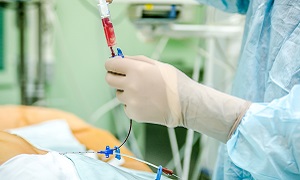
On the day of the transplant procedure, also known as Day Zero, the patient undergoes the transfusion through a thin tube called the Central Line injected into the chest area of the patient. The stem cells introduced will make it to the bone marrow and fill up the gap left by the diseases stem cells and over 10 to 28 days the effects of the new stem cells will start showing as they start to repopulate the area
What to expect after Allogenic Transplant?
The stem cells refrigerated after the conditioning process is often coated with a preservative which may or may not cause certain symptoms post the transplant procedure. These symptoms can be in the form of-
- Chest pain
- Fever
- Chills
- Nausea and Vomiting
- Headache
- Diarrhea
- Shortness of breath
- Fatigue
- Bleeding disorders
- Mouth ulcers
Possible complications
Due to the reduced immune system, patients may experience low blood count which in turn makes them vulnerable to certain infections. Patient’s may have to undergo blood transfusions if their haemoglobin level falls or antibiotics and medicines to flush out the preservatives from the system and to protect the body from being exposed to infections.
Another possible complication can be the GVHD or the graft-versus-host disease where the immune system of the patient recognizes the newly introduced donor cells as foreign and harmful and might attack it. The intensity of this complication varies from patient to patient and medical drugs and constant monitoring are prescribed to tackle this situation
Recovery & care after Allogenic Bone Marrow Transplant
You’ll be asked to stay back in the hospital for a few days to monitor your recovery during which the medical team will help you out with the required medicine doses and diet chart. However, once you are released, the care and recovery are completely dependant on the patient. Please keep these pointers in mind:
Maintain a strict diet. Ask your doctor or medical team for a dietary chart and abide by it strictly to improve your recovery rate.
- Ask your doctor about vaccinations necessary to help you improve your immune system.
- Always take your medicine doses on time and don’t make any changes in your everyday medical routine unless advised otherwise by the doctor.
- Avoid weight gain at all cost.
- Avoid strenuous physical activities but make sure you exercise to keep yourself from unwanted weight gain.
FAQs
What is the usual hospital stay for an allogenic transplant?
Hospital stays depend on the patient’s recovery rate. However, a minimum 2-4 week is given to monitor the condition and patients might be asked to stay back or visit for routine follow-ups to consistently monitor their recovery.
What is the success rate for allogenic transplant?
Usually, allogenic transplant success rates heavily depend on how close a match the donor is. With the right donor, the success rates can be as high as 60-80%
What are the chances of my family members being my donors?
Almost 7 out of 10 cases noted that family members weren’t a close match. The match works only 1 out of 4 times for brothers or sisters. This is why the bone marrow registry is also consulted and 1 out of 430 matches are selected to be the perfect match
Will donating bone marrow affect me in any way?
Usually, only 4-6% of the donor’s bone marrow is extracted and the bone marrow regenerates itself within 4-6 weeks. Donating bone marrow will not affect donors permanently.
Are there any symptoms or risks to donating bone marrow?
Risks are rare and affect only 1% of bone marrow donors seriously. However, donors may feel certain side effects in terms of headache, muscle pain, nausea, or common flu symptoms. However, if any symptoms persist for more than a week, contact the medical team immediately.
What happens if my transplant fails?
Even though it’s rare, a failed transplant is possible. However, in that case, doctors usually recommend a second transplant.
What happens if my cancer comes back?
The sole purpose of the medical procedure is to kill or prolong the diseased cells affecting you. Even though the success rate is high, some patients have experienced a relapse. However, this is rare and in such cases a second transplant is advised by the doctors.

